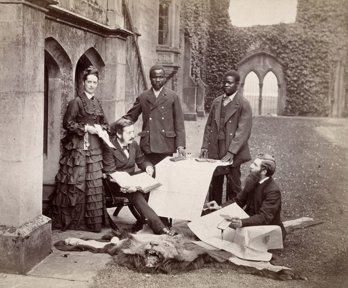
Equality, diversity and inclusion
The promotion of equality, diversity and inclusivity (EDI) are core values for the practice, study and teaching of geography. They are also embedded in the Society’s strategic plan which guides our work.
You can download and read our annual report to Council on our approach to, and performance on, a broad range of EDI issues.
The Society
The Society has a long and complicated history. Founded in 1830, our status as a leading UK-institution emerged from the structures of imperialism and colonialism. Throughout our history, our Fellows have discussed and challenged the prevailing conventions, however change was often slow. For example, women were only admitted as permanent Fellows in 1913, and the vital contributions of Indigenous people to expeditions were sometimes overlooked despite The Pundit Nain Singh being awarded the Patron's Medal in 1877.
Today, the Society is a very different organisation, and over the last two decades we have undertaken a broad programme of work that critically engages with our history, bringing to the fore the previously hidden contributions made to geography, and to the Society.
However, we need to do more to embed this at the heart of everything the Society does both in its own activities and in engaging with the wider geographical community to forge a more socially representative community – across age, gender, race, ethnicity, sexuality, disability, and socio-economic background – evaluating, generating and promoting best practice, and transforming how we work.
Geography as a discipline
In schools and among undergraduates, geography is one of the most gender-balanced subjects. Significant inequalities still exist in more senior ranks and roles, but progress in terms of gender has been, and is being, made.
However, inequalities in terms of race and ethnicity are significant and demand attention. While the greatest growth in those taking GCSE geography over the last five years has been among BAME students, these groups are significantly underrepresented at A Level and at university. This underrepresentation becomes even more pronounced among academic staff, as documented in both the International Benchmarking Review of Physical Geography (2017) and the ESRC International Benchmarking Review of Human Geography (2013), and among geography professionals.
Our work
We are actively committed to doing better, to enabling those underrepresented in the discipline to get involved directly in the work of the Society and more broadly for the discipline of geography. Across the Society we are:
-
Investing resources in the evidence base by mapping and monitoring diversity trends in the educational and professional pipeline, in terms of participation and attainment.
-
Undertaking surveys and delivering workshops to evaluate, promote and generate best practice on EDI across the discipline, and establishing an online resource hub.
-
Supporting mentoring schemes, with a special focus on marginalised and underrepresented groups in the discipline.
-
Working to better embed equality, diversity and inclusion into Society policies, processes and governance – including codes of conducts for conferences and specialist groups; prizes, awards and events; and annual reporting and reviews.
-
The Equality, Diversity & Inclusion and Sustainability Review Group provides oversight of our work on EDI and reports to Council. It also provides a forum for consideration of issues arising in this area (e.g. a major news event or policy issue) on an ad-hoc as needs basis.
-
Thinking critically about the Society's history and how we represent it within our building.
We are also working with our core audiences to help create positive and inclusive environments, where all sections of the community can see themselves represented.




